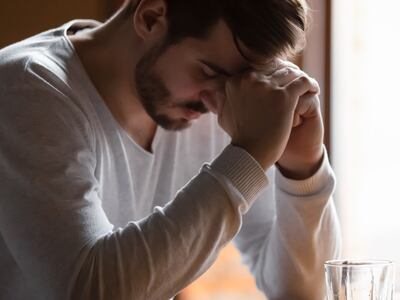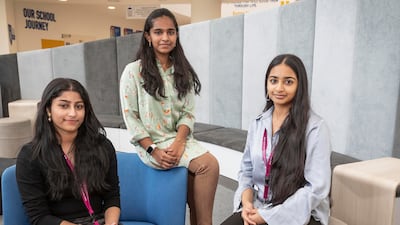A group of Dubai pupils have developed an app that uses artificial intelligence to administer a chemical through a skin patch to help people with alcohol addiction.
The app has already won international recognition and is expected to be displayed at the upcoming Cop28 climate change conference.
Sanah Joseph, Naina George and Aradhana Sivaraman, all Year 12 Indian pupils at Gems Wellington Academy in Silicon Oasis, created Rehabity, an app that uses a skin patch to monitor a person’s blood pressure, oxygen saturation, and drug capacity to determine if there is alcohol in their system.
When a person takes alcohol, their vital signs change which is detected by the sensors and the electrodes in the patch. If there are any spikes in the readings, such as in heart rate, then a small amount of antabuse, a chemical that causes a metallic taste in the mouth and nausea when combined with alcohol, is released.
If there is a significant amount of alcohol detected, the app will automatically make an emergency call to the nearest hospital.
On show at Cop28
The teenagers will present their prototype at Cop28. The project was one of only 10 around the globe to be awarded the Microsoft Imagine Cup Junior 2023, which is a global competition aimed at pupils aged between 13 and 18.
The competition is for pupils to develop an understanding and application of AI that can be used as a force for good.
The goal of the Rehabity project was to help people of all ages who wanted to recover from alcohol addiction, according to Ms George.
“People are not always able to go to rehabilitation centres due to a range of factors including finance and we wanted to create an app that allowed people to have the same effect but in the comfort of their own homes," Ms George said.
“Our application incorporates artificial intelligence, and there will be an emergency contact listed, so that in case of any emergency that contact will be alerted.
"We definitely do think it's [alcohol addiction] a prevalent issue which is why we wanted to expand on the idea."
Dangers of alcohol abuse
There are an estimated three million deaths around the globe each year that are directly linked to alcohol abuse, according to the latest figures from the World Health Organisation.
The same study said alcohol causes death and disability relatively early in life. In people aged between 20 and 39 years, approximately 13.5 per cent of total deaths are attributable to alcohol.

The harmful use of alcohol is a causal factor in more than 200 disease and injury conditions, the WHO said.
The group used aversion therapy to build alcohol abstinence by developing dislikes to the taste, smell and sight of alcohol.
This is accomplished by pairing alcohol with unpleasant symptoms, which are induced by a chemical agent.
The pupils said they hoped to expand the use of the application to other drugs in future but are focusing on alcohol at present.
Ms Joseph said they initially became interested in aversion therapy when they learnt about it at school.
"The reason that we want to present at Cop28 is because we know that a lot of people internationally will be there and we want to showcase the innovative solution to alcohol addiction so that it reaches masses and people come to know about it," she said.
"Once people start talking about it, we can upgrade our solution to make it even more realistic and even more marketable."
Future plans
While the app is still very much in its initial phase, the group hopes it can be taken to market in the future, Ms Sivaraman said.
“We know what the app will look like and also have a basic understanding and working of the prototype," she said.
"We will search for any healthcare providers, or individuals who are willing to develop this further. With help from our mentors and our teachers, we will try to develop the app through coding.
“We intend to take it to market, but need some help and guidance."
She said their idea was driven by a desire to reduce dependence on rehabilitation centres.
"The integration of AI adds a powerful dimension to the solution," said Shafaque Riaz, department head for ICT and Computer Science at Gems Wellington Academy Silicon Oasis.
"The inclusive approach could potentially make the solution accessible to a wider range of people seeking help with addiction issues."


